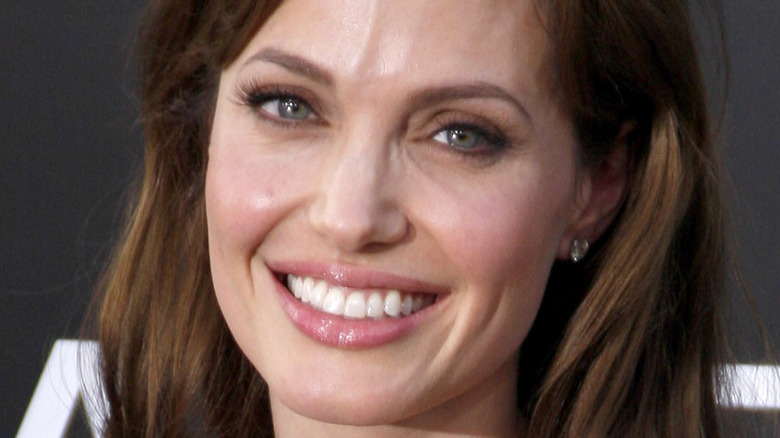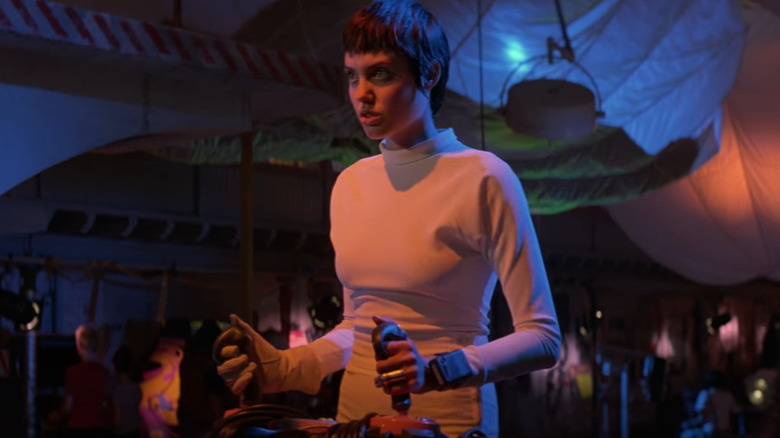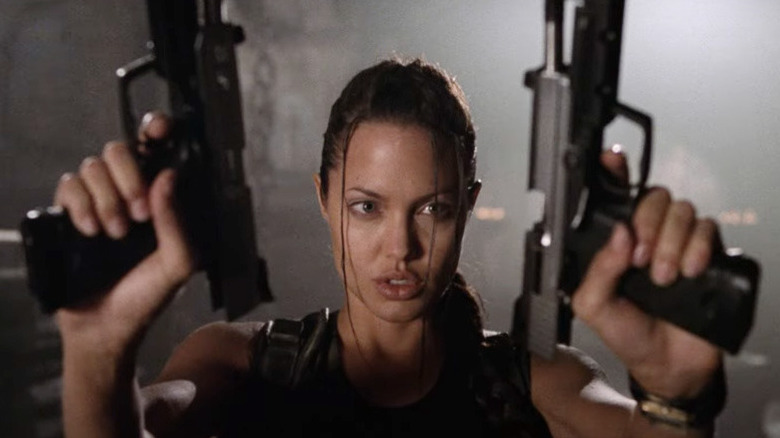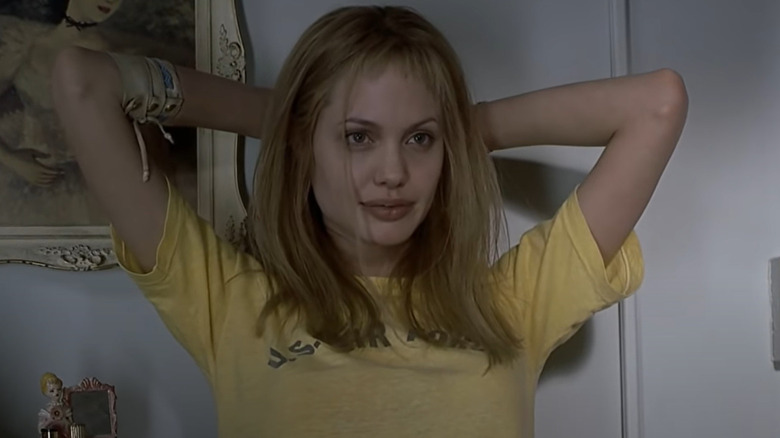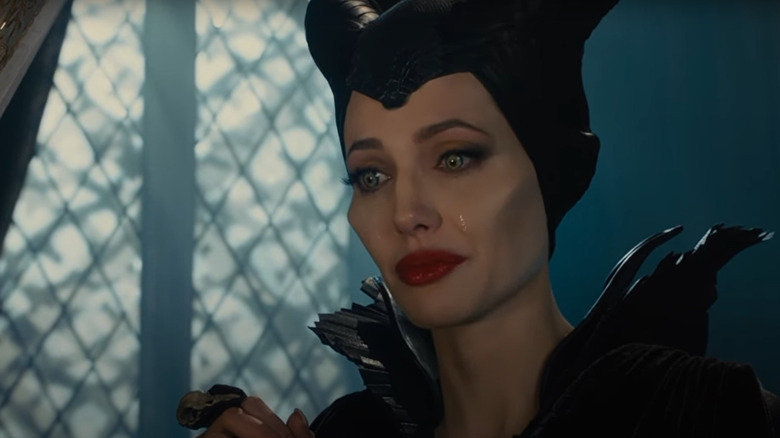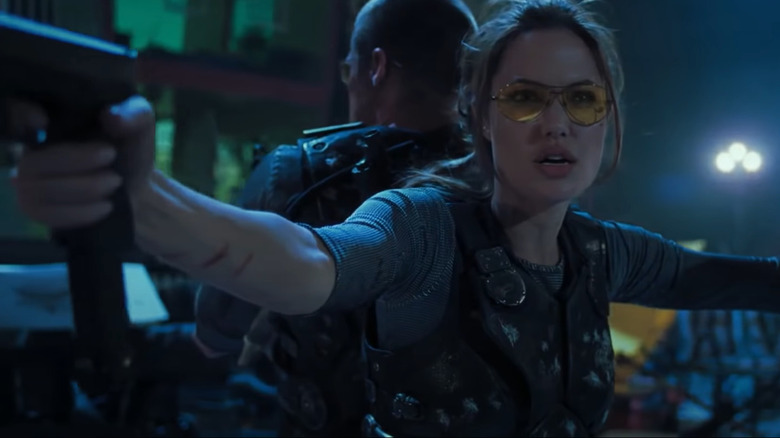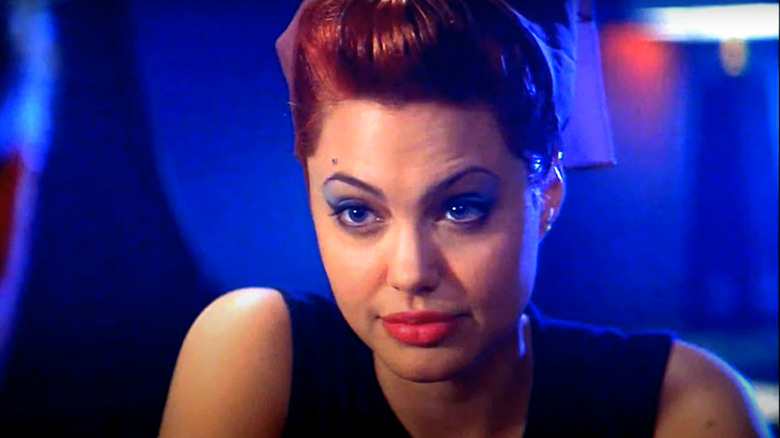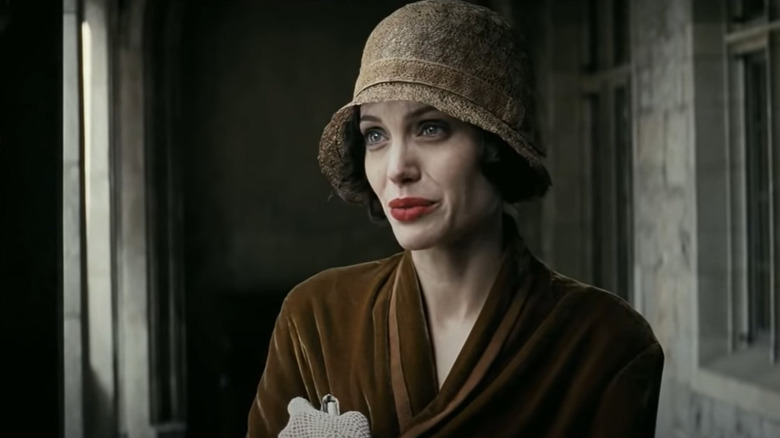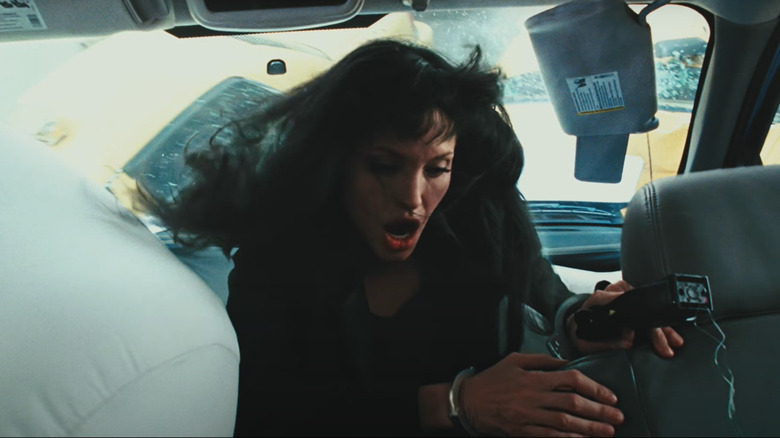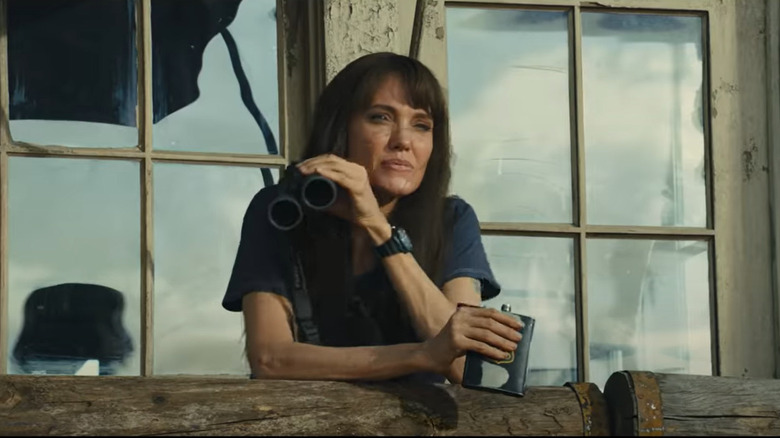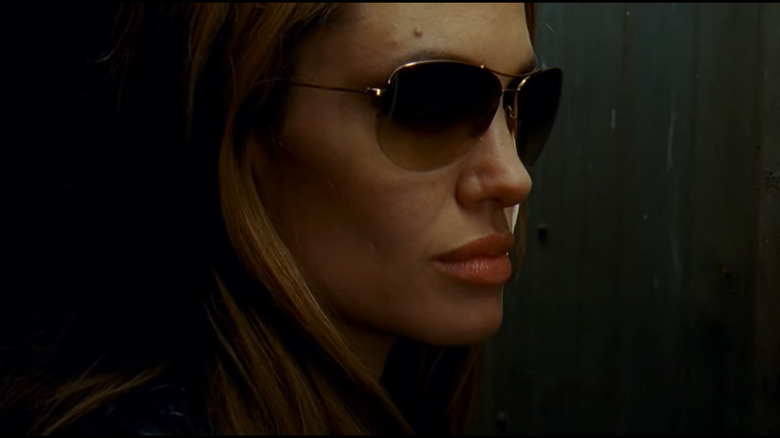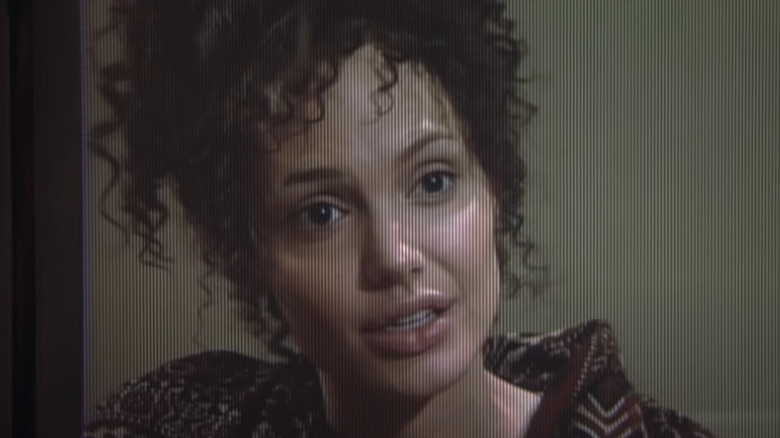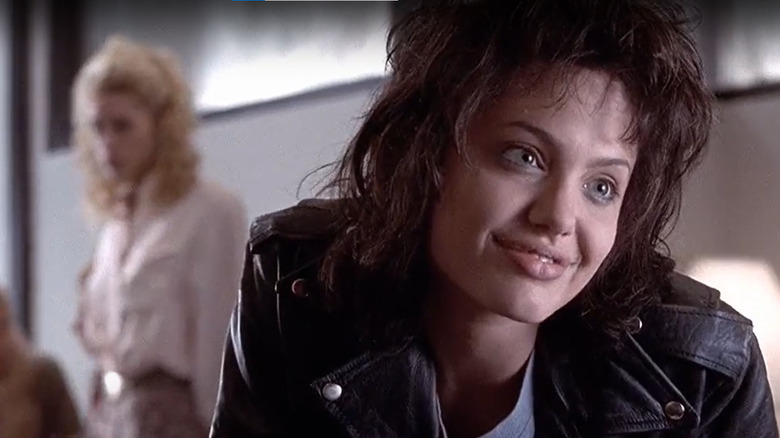Angelina Jolie's Best Movie Roles
Angelina Jolie is a Hollywood institution. Her presence in "Eternals" adds a degree of credibility to the rest of the project and might even make the entire Marvel Cinematic Universe (MCU) look a little less ... ah ... well, like some kind of awkward nerd thing. After all, it's got to be a party for cool kids if Angelina Jolie is hanging out, right?
While the modern era of blockbusters values intellectual properties over movie stars, Jolie endures as a marketable brand in and of herself, and she has for decades. Only an elite echelon of Hollywood stars — a group that includes Leonardo DiCaprio, Robert De Niro, and a few others – can say the same. Since her career kicked off in earnest with roles in music videos and cult favorites like "Foxfire," Jolie's been a more or less continuous big screen presence. But what are her greatest hits? The films that show off her comedy chops, action bona fides, and dramatic credentials? Well, join us as we look through Jolie's films and search for her very best movie roles.
Hackers
"Hackers" — the 1995 cyberpunk thriller that introduced Angelina Jolie to the world — is not a "good" movie in the traditional sense, but it is great in every respect that truly matters.
In her first feature-length starring role, Jolie plays Kate Libby — a teenage hacker who operates under the online alias "Acid Burn." Alongside her digitally mischievous high school chums, Acid Burn uncovers an international extortion plot perpetrated by an evil corporate hacker code-named "The Plague" (Fisher Stevens). Lots of wicked fast typing and roller blading ensues.
Jonny Lee Miller plays Dade Murphy — aka Crash Override, aka Zero Cool — who's technically the main character. However, between Dade's bland personality and Miller's shaky American accent, it feels very reasonable to suggest that a better version of "Hackers" would've had the charismatic riot grrrl enthusiast Kate Libby as its central figure and rewritten Dade as a nihilistic, Scottish James Bond nerd in order to play to the strengths of mid-'90s Miller.
Though a critical and commercial failure at the time of its release, over the years, "Hackers" has developed a cult following that's forced the world to look at its techy premonitions in a whole new light.
Lara Croft: Tomb Raider
Though panned by critics during its 2001 theatrical run, "Lara Croft: Tomb Raider" turned around enough ticket stubs to justify a sequel and a 2018 remake. However, the mere fact that Angelina Jolie and the "Tomb Raider" franchise forged a fiscally rewarding partnership isn't the only reason why Lara Croft is important to her legacy.
By the end of the '90s, Jolie had established herself as a legitimate dramatic actor and an iconoclastic presence in the tabloids, but nobody really thought of her as a blockbuster action star. With her two "Lara Croft" movies, Jolie managed to fold stunts and fight sequences into her professional identity, which means if she hadn't been cast in "Lara Croft," it's possible several of the other films on this list either wouldn't exist, or someone else would've done Jolie's part.
The Tomb Raider series also demonstrates Jolie's willingness to take a risky role every now and again. Movies based on video games don't exactly have a track record for critical acclaim and financial success. Especially coming off of her Oscar victory for the literary drama "Girl, Interrupted," signing up to play Lara — who's essentially a younger, female, British, less-famous Indiana Jones — was an unintuitive career choice.
Girl, Interrupted
Based on the memoir by Susanna Kaysen, "Girl, Interrupted" is still culturally relevant more than 20 years after the film hit theaters. It retains high visibility on streaming platforms, its young cast almost all went on to individual stardom, and all three of the women we knew in the early '00s owned copies of the book with the film's fictionalized Susanna (Winona Ryder) gracing the cover.
Oversimplified as "My So-Called Life" meets "One Flew Over the Cuckoo's Nest," "Girl, Interrupted" documents Susanna's late 1960s nervous breakdown and subsequent recovery at a mental health facility. Her fellow patients include wayward young women played by the illustrious likes of Clea DuVall, Brittany Murphy, Elisabeth Moss, and most pertinently, Angelina Jolie as Lisa Rowe.
Lisa contains the mania of R.P. McMurphy and the manipulative toxicity of Nurse Ratched in equal measure, granting Jolie loads of material with which to emote, convey questionable ethics, and steal scenes. In fact, she was such a powerhouse that Jolie took home a Best Supporting Actress Oscar for her performance.
Maleficent
Let us remember that as of "Eternals," Angelia Jolie stars in two Disney franchises.
The first of what became a wave of ventures that re-purpose classic villains as misunderstood protagonists — looking your way, "Joker," "Ratched," and "Cruella" — "Maleficent" deconstructs the old Sleeping Beauty myth and establishes a sympathetic backstory for the eponymous sorceress. Jolie's job in the title role isn't too far removed from her "Girl, Interrupted" assignment. Maleficent and Lisa Rowe are both morally ambiguous, charismatic, misunderstood iconoclasts. The difference is Lisa wants other people to think she's a cartoon supervillain, whereas Maleficent literally is one.
While hard to imagine now, a movie about how an evil queen from the golden age of Disney animation was secretly a gentle soul all along probably seemed like a risky prospect in its early stages. Such fears would've proved groundless — "Maleficent" ended its theatrical run with more than $750 million in ticket stubs to its credit, making it one of Jolie's greatest box office triumphs.
Mr. & Mrs. Smith
As far as the history books go, the behind-the-scenes real life romance between Angelina Jolie and costar Brad Pitt will thoroughly overshadow the merits of "Mr. & Mrs. Smith" forevermore — and in a way, that's a little unfortunate.
Critics didn't exactly love the Doug Liman-directed shoot-'em-up, but its very respectable box office performance squashed any lingering doubt about Jolie's action star bonda fides. As it turns out, she can absolutely pretend to kill people and blow things up in an exciting manner without relying on an established video game IP to sell audiences on the experience.
As for the plot, John (Pitt) and Jane Smith (Jolie) are a husband and wife and world-class assassins, but neither are aware of the other's true vocation. One day, their bosses from their respective clandestine outfits assign them to kill each other. Sexy, sexy mayhem ensues, or as Kurt Loder put it back in 2005, "[Pitt and Jolie's] chemistry, both verbal and physical, is exhilarating. ... Neither of them has ever been better than they are in this movie."
Playing by Heart
"Playing by Heart" sports so many signature trappings of a late '90s Blockbuster VHS rental — Angelina Jolie, Jay Mohr, overreliance on dialogue-heavy scenes that take place at drinking establishments and probably aren't as charming as the movie thinks they are — that we're downright confounded that so many of us haven't heard of this one.
How is it possible we've seen "Hackers" 25 times but didn't know "Playing by Heart" existed until just now? It's got Agent Scully and the 9/11-era "Daily Show" Guy in it for cryin' out loud.
Also costarring Sean Connery and Ellen Burstyn, "Playing by Heart" sees Joan — a stylishly loquacious, cat-loving urbanite — inexplicably falling for Keenan, a purple-haired sad sack played by Ryan Phillippe. Jolie infuses Joan with a powerful essence of Holly Golightly, and her scenes with Phillippe can be efficiently summarized as "Manic Pixie Dream Girl meets Depressive Vampire Nightmare Boy."
Critics and audiences give "Playing by Heart" decent marks, so if you're the sort of person who's watched "Swingers" or maybe even one of the first three Kevin Smith movies more than once, this film might be in your sandbox.
Changeling
Angelina Jolie snatched a Best Actress nomination at the 81st Academy Awards for her turn as Christine Collins — a Los Angeles woman whose 9-year-old son vanished in 1928. As their inability to quickly solve the child's disappearance harmed the department's reputation, the LAPD pressured Collins to accept an imposter as her child. And after that didn't work, they briefly arranged for her imprisonment in a psychiatric institution.
Directed by Clint Eastwood with a script by J. Michael Straczynski — noted as the creator of "Babylon 5" and a prolific writer for television and Marvel Comics — "Changeling" also counts John Malkovich amongst its cast as the righteous Rev. Gustav Briegleb. Critics didn't mind "Changeling," but we wonder if the initial response suffered from the film's generally Oscar-baity aura. After all, it's a prestige period piece with a movie star playing against type in the lead – essentially the textbook definition of "Oscar bait." But now that we see "Changeling" in a context more than a decade removed from the 2009 Academy Awards, we might find it holds up better than expected.
While Jolie devoted much of the 2000s to stunt-heavy action films, Collins affords her the opportunity to explore everyday human emotions like panic, helplessness, and horrified indignation. "Changeling," if nothing else, reminded the universe of 2008 that Jolie is actually a pretty darn good actor, and it kept her resume from getting bogged down in interchangeable spy/assassin roles.
Salt
It's hard to look at "Salt" — a star vehicle Angelina Jolie inherited when Tom Cruise dropped out — without thinking of Jason Bourne movies or numerous other espionage and explosion-based cinema experiences in the same spirit. But maybe that's not such a bad thing?
Directed by Phillip Noyce, "Salt" delivers the tale of Evelyn Salt (Jolie), a CIA operative who might be a Russian sleeper agent. Evelyn embarks upon an international adventure stuffed with murder, double-crosses, car chases, property damage, and enough plot twists to make this movie's Wikipedia plot summary utterly incomprehensible.
Jolie does her own stunts on "Salt," but according to a 2010 interview with ABC News, she makes sure the risks she takes are of the calculated variety. "Because I have six children, I would never do something that could kill me," she says. "But there were things that could've broken my arm or broken my leg or that kind of a thing."
Before anyone looks at its very average critical response and dismisses "Salt" as a second-rate "Mission: Impossible," let us note that the project more than held its own at the box office despite direct competition from a much more enduring action film — "Inception," Christopher Nolan's psychedelic follow-up to "The Dark Knight." The mere fact that "Salt" avoided utter financial annihilation under the circumstances — so much so that there was talk of a "Salt" sequel at one point — should earn it a place amongst Jolie's better at-bats.
Those Who Wish Me Dead
Often described as a return to the type of grounded action-adventure sagas that felt commonplace in the '90s, "Those Who Wish Me Dead" sees Angelia Jolie play Hannah Faber, a "smokejumper" — more or less a firefighter of the forest — who stumbles into the stewardship of a young boy targeted for termination by organized crime.
While "Those Who Wish Me Dead" provides more than its fair share of bullets and flames, Hannah operates roughly like a normal person, not a supernaturally competent espionage and murder expert like the main characters in most of Jolie's other action flicks. In other words, Jolie's a little less James Bond and a little more John McClane in this one. And on average, critics and audiences consider "Those Who Wish Me Dead" a perfectly sufficient experience for anyone wishing to see Jolie running around in the woods while battling hitmen and protecting a little kid for roughly 100 minutes.
Released simultaneously in theaters and on the streaming platform HBO Max — like a handful of Warner Bros. projects in 2021 — "Those Who Wish Me Dead" hardly counts as a box office bonanza. Ironically, we can suppose it was likely watched by quite a few more folks than its $23 million theatrical run indicates. After all, it was free with an HBO Max subscription, and plenty of us had extra time on our hands and/or an inflated need for escapist excitement in 2021.
Wanted
From the mind of comic book creator Mark Millar — perhaps best known as the writer of the story the MCU eventually adapted as "Captain America: Civil War" — "Wanted" casts Angelina Jolie as the mysterious assassin codenamed Fox. She's charged with guiding downtrodden regular shmuck Wesley Gibson (James McAvoy) into embracing his destiny as a badass master assassin, which is his birthright, as bequeathed to him by his father, who was also a badass master assassin.
"Wanted" is so deeply saturated in adolescent male wish fulfillment that full exposure to its 110 minute runtime may trigger unpredictable hormonal reactions amongst certain audience members. Nevertheless, "Wanted" garnered some of Jolie's all-time best reviews. Maybe if watching "Wanted" means waking up the next day with hair growing out of unexpected regions of your anatomy, it could be worth the trade-off?
As for her character, in the "Wanted" behind the scenes featurette, McAvoy elegantly summarized the mentorship role Jolie's "Fox" plays for his character. "She is like my conditioner," she says. "My drill sergeant. ... She kicks my ass a lot. She kicks it and kicks it and kicks it again, and then when it's had five minutes to rest, she kicks it again."
A Mighty Heart
If "A Mighty Heart" came out in 2021, lots of media discourse would focus on the questionable choice of casting Angelina Jolie as mixed-race protagonist Mariane Pearl, who wrote a memoir about her ultimately futile campaign for the safe release of her husband, Daniel Pearl, an American journalist kidnapped by terrorists in 2002.
Meanwhile, reviews from the era weren't overly concerned with the loathsome history of blackface performances in American entertainment, but they did wonder if audiences could separate Jolie's acting in a serious film from the ubiquitous tabloid presence of her relationship with Brad Pitt — nicknamed "Brangelina."
Almost 15 years later, society is much more practical about which parts of movies we find problematic. We're certainly not going to tell anyone how to feel about a white actor playing a dark-skinned character, but we should note that Pearl herself signed off on Jolie taking the lead role.
"I asked her to play the role ... because I felt a real kinship to her," Pearl told Time Magazine in 2007, adding, "I think she understood why we should do this movie. We had something to say that we knew we should say together."
Jolie's performance — described by NPR as "admirably subdued" and lauded by Time Out as a "calm, intelligent presence" under horrific and chaotic circumstances – garnered SAG and Golden Globe nominations. "A Mighty Heart" also happens to be the best-reviewed Angelina Jolie movie with a traditional theatrical release.
Gia
Could it be that one of the best movies Angelina Jolie ever made is a mildly exploitative straight-to-cable endeavor? Keep in mind, "Gia" hit the small screen the year before "The Sopranos" came along and began HBO's transformation into a prestige-oriented operation for high-minded adult drama. Back in the '90s, HBO was basically known as the station where they didn't bleep the swear words.
"Gia" sure doesn't bleep the swear words, nor does it obscure plenty of other stuff that would preclude its airing on a family-friendly platform. But, like "The Sopranos," "Gia" forces the viewer to take an uncomfortable look at American culture's aspirational excess and decadence, as well as the casual commodification of young women.
Gia Carangi (Jolie) rockets towards supermodeldom in the late-'70s and early '80s, but she doesn't live to see the Reagan years end. "Gia" comes from an era loaded with cinematic, drug-crazed downward spirals — some preachy, some crassly comic — but Jolie, who took home a Golden Globe for her performance, infuses Gia with a wide-eyed wonder and justified confidence that squashes any notion that her story is simply one of inevitable consequences for bad choices. Instead, it appears something much larger and more serious has gone wrong here.
